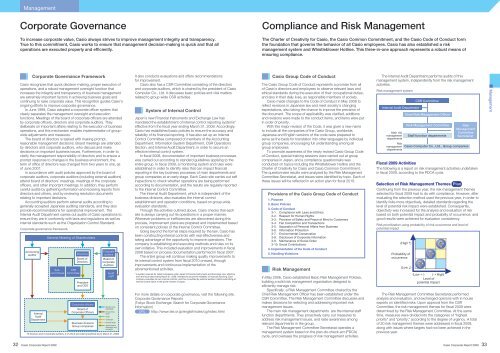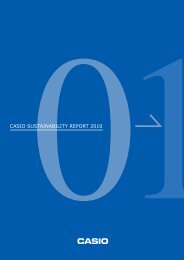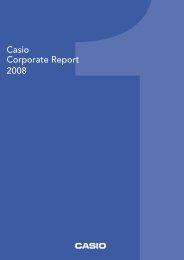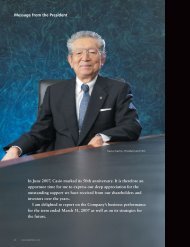Casio Computer Co. Ltd
Corporate Report 2009 all pages - Casio
Corporate Report 2009 all pages - Casio
- No tags were found...
Create successful ePaper yourself
Turn your PDF publications into a flip-book with our unique Google optimized e-Paper software.
Management<br />
<strong>Co</strong>rporate Governance<br />
To increase corporate value, <strong>Casio</strong> always strives to improve management integrity and transparency.<br />
True to this commitment, <strong>Casio</strong> works to ensure that management decision-making is quick and that all<br />
operations are executed properly and efficiently.<br />
<strong>Co</strong>mpliance and Risk Management<br />
The Charter of Creativity for <strong>Casio</strong>, the <strong>Casio</strong> <strong>Co</strong>mmon <strong>Co</strong>mmitment, and the <strong>Casio</strong> <strong>Co</strong>de of <strong>Co</strong>nduct form<br />
the foundation that governs the behavior of all <strong>Casio</strong> employees. <strong>Casio</strong> has also established a risk<br />
management system and Whistleblower Hotline. This three-in-one approach represents a robust means of<br />
ensuring compliance.<br />
<strong>Co</strong>rporate Governance Framework<br />
<strong>Casio</strong> recognizes that quick decision-making, proper execution of<br />
operations, and a robust management oversight function that<br />
increases the integrity and transparency of business management<br />
are extremely important factors in achieving business goals and<br />
continuing to raise corporate value. This recognition guides <strong>Casio</strong>’s<br />
ongoing efforts to improve corporate governance.<br />
In June 1999, <strong>Casio</strong> adopted a corporate officer system that<br />
clearly separates the management oversight and execution<br />
functions. Meetings of the board of corporate officers are attended<br />
by corporate officers, directors and corporate auditors. They<br />
deliberate on important affairs relating to the execution of business<br />
operations, and this mechanism enables implementation of groupwide<br />
adjustments and measures.<br />
The board of directors is tasked with making prompt,<br />
reasonable management decisions. Board meetings are attended<br />
by directors and corporate auditors, who discuss and make<br />
decisions on important business issues. Furthermore, in order to<br />
clarify the management responsibility of directors and to ensure a<br />
prompt response to changes in the business environment, the<br />
term of office of directors was changed from two years to one, as<br />
of June 2007.<br />
In accordance with audit policies approved by the board of<br />
corporate auditors, corporate auditors (including external auditors)<br />
attend board of directors’ meetings, meetings of the corporate<br />
officers, and other important meetings. In addition, they perform<br />
careful audits by gathering information and receiving reports from<br />
directors and others, and by reviewing resolution documents<br />
relating to important decisions.<br />
Accounting auditors perform external audits according to<br />
generally accepted Japanese auditing standards, and they also<br />
provide recommendations for operational improvement. The<br />
Internal Audit Department carries out audits of <strong>Casio</strong> operations to<br />
ensure they are in conformity with laws and regulations as well as<br />
internal standards such as the Organization <strong>Co</strong>ntrol Standard.<br />
<strong>Co</strong>rporate governance framework<br />
Accounting<br />
auditor<br />
Internal<br />
Audit<br />
Department<br />
General Meeting of Shareholders<br />
Subcommittees<br />
CSR<br />
<strong>Co</strong>mmittee<br />
Directors<br />
Board of<br />
Directors<br />
President<br />
and CEO<br />
<strong>Co</strong>rporate officers<br />
Board of<br />
<strong>Co</strong>rporate Officers<br />
Business divisions<br />
Group companies<br />
<strong>Co</strong>rporate<br />
auditors<br />
Board of<br />
<strong>Co</strong>rporate<br />
Auditors<br />
Audit<br />
staff<br />
Election and<br />
discharge<br />
Accounting<br />
audit<br />
Audit<br />
Oversight<br />
Internal audit<br />
Appointment,<br />
dismissal, and<br />
oversight<br />
10 directors and 3 corporate auditors, 2 of which are external auditors (as of March 31, 2009)<br />
It also conducts evaluations and offers recommendations<br />
for improvement.<br />
<strong>Casio</strong> also has a CSR <strong>Co</strong>mmittee consisting of the directors<br />
and corporate auditors, which is chaired by the president of <strong>Casio</strong><br />
<strong><strong>Co</strong>mputer</strong> <strong>Co</strong>., <strong>Ltd</strong>. It discusses basic policies and vital matters<br />
related to group-wide CSR activities.<br />
System of Internal <strong>Co</strong>ntrol<br />
Japan’s new Financial Instruments and Exchange Law has<br />
mandated the establishment of internal control reporting systems*<br />
effective from the fiscal year ending March 31, 2009. Accordingly,<br />
<strong>Casio</strong> has established basic policies to ensure the accuracy and<br />
reliability of its financial reporting. It has also set up an Internal<br />
<strong>Co</strong>ntrol <strong>Co</strong>mmittee composed of members of the Accounting<br />
Department, Information System Department, CSR Operations<br />
Section, and Internal Audit Department, in order to secure an<br />
effective internal control system.<br />
In fiscal 2008, documentation of important business processes<br />
was carried out according to standard guidelines applying to the<br />
entire group. In fiscal 2009, a monitoring system and rules were<br />
established in order to identify risks that can impact financial<br />
reporting in the key business processes of main departments and<br />
group companies at an early stage. Each <strong>Casio</strong> site carries out self<br />
inspections to check whether operations are being performed<br />
according to documentation, and the results are regularly reported<br />
to the Internal <strong>Co</strong>ntrol <strong>Co</strong>mmittee.<br />
The Internal Audit Department, which is independent of the<br />
business divisions, also evaluates the internal control<br />
establishment and operation conditions, based on group-wide<br />
evaluation standards.<br />
Through the activities outlined above, <strong>Casio</strong> checks that each<br />
site is always carrying out its operations in a proper manner.<br />
Whenever problems or inefficiencies are discovered during this<br />
process, improvement plans are prepared and implemented based<br />
on consistent policies of the Internal <strong>Co</strong>ntrol <strong>Co</strong>mmittee.<br />
Going beyond the formal steps required by the law, <strong>Casio</strong> has<br />
been constructing internal controls with real effectiveness and<br />
taking advantage of the opportunity to improve operations. The<br />
company is establishing and executing methods and rules on its<br />
own initiative. This included evaluation and improvements in fiscal<br />
2008 based on process documentation performed in fiscal 2007.<br />
The entire group will continue making quality improvements to<br />
its internal control system from fiscal 2010 onward, through<br />
improvements and continuous implementation of the<br />
aforementioned activities.<br />
* A system required for listed companies under Japan’s Financial Instruments and Exchange Law, effective<br />
from the fiscal year ending March 31, 2009, intended to secure the reliability of financial reporting. Each<br />
company evaluates its own internal controls, and then is audited by external auditors, before submitting an<br />
internal control report to the prime minister of Japan.<br />
For more details on corporate governance, visit the following site.<br />
<strong>Co</strong>rporate Governance Reports<br />
(Tokyo Stock Exchange: Search for <strong>Co</strong>rporate Governance<br />
Information)<br />
URL http://www.tse.or.jp/english/rules/cg/index.html<br />
<strong>Casio</strong> Group <strong>Co</strong>de of <strong>Co</strong>nduct<br />
The <strong>Casio</strong> Group <strong>Co</strong>de of <strong>Co</strong>nduct represents a promise from all<br />
of <strong>Casio</strong>’s directors and employees to observe relevant laws and<br />
ethical standards during the execution of their occupational duties,<br />
and also in their daily lives, as responsible members of society.<br />
<strong>Casio</strong> made changes to the <strong>Co</strong>de of <strong>Co</strong>nduct in May 2008 to<br />
reflect revisions in Japanese law and meet society’s changing<br />
expectations, also taking the chance to improve the precision of<br />
the document. The scope of applicability was clarified, additions<br />
and revisions were made to the conduct items, and items were put<br />
in order of priority.<br />
With this major revision of the <strong>Co</strong>de, it was given a new name<br />
to include all the companies of the <strong>Casio</strong> Group, worldwide.<br />
Japanese and English versions of the code were prepared to<br />
serve as the basis for translation into other languages by individual<br />
group companies, encouraging full understanding among all<br />
group employees.<br />
To promote awareness of the newly revised <strong>Casio</strong> Group <strong>Co</strong>de<br />
of <strong>Co</strong>nduct, special training sessions were carried out at group<br />
companies in Japan, and a compliance questionnaire was<br />
conducted on topics including the Whistleblower Hotline and the<br />
Charter of Creativity for <strong>Casio</strong> and <strong>Casio</strong> <strong>Co</strong>mmon <strong>Co</strong>mmitment.<br />
The questionnaire results were analyzed by the Risk Management<br />
<strong>Co</strong>mmittee Secretariat, and issues were identified by topic. Each of<br />
these issues will be reflected in an action plan for fiscal 2010.<br />
Provisions of the <strong>Casio</strong> Group <strong>Co</strong>de of <strong>Co</strong>nduct<br />
1. Purpose<br />
2. Basic Policies<br />
3. <strong>Co</strong>de of <strong>Co</strong>nduct<br />
3-1. <strong>Co</strong>mpliance with Laws and Ethics<br />
3-2. Respect for Human Rights<br />
3-3. Provision of Safety and Peace of Mind to Customers<br />
3-4. Fair <strong>Co</strong>mpetition and Transactions<br />
3-5. Separation of Personal Affairs from Business<br />
3-6. Information Protection<br />
3-7. Environmental <strong>Co</strong>nservation<br />
3-8. Disclosure of <strong>Co</strong>rporate Information<br />
3-9. Maintenance of Social Order<br />
3-10. Social <strong>Co</strong>ntributions<br />
4. Implementation of the <strong>Co</strong>de of <strong>Co</strong>nduct<br />
5. Handling Violations<br />
Risk Management<br />
In May 2006, <strong>Casio</strong> established Basic Risk Management Policies,<br />
building a solid risk management organization designed to<br />
efficiently manage risk.<br />
Specifically, a Risk Management <strong>Co</strong>mmittee chaired by the<br />
Chief Risk Management Officer has been established under the<br />
CSR <strong>Co</strong>mmittee. The Risk Management <strong>Co</strong>mmittee discusses and<br />
makes decisions for selecting and addressing important risk<br />
management issues.<br />
The main risk management departments are the internal staff<br />
function departments. They proactively carry out measures to<br />
address risk management issues, and raise awareness among<br />
relevant departments in the group.<br />
The Risk Management <strong>Co</strong>mmittee Secretariat operates a<br />
management system based on the plan-do-check-act (PDCA)<br />
cycle, and oversees the progress of risk management activities.<br />
The Internal Audit Department performs audits of this<br />
management system, independently from the risk management<br />
activities.<br />
Risk management system<br />
Internal Audit Department<br />
Main risk<br />
management<br />
departments<br />
Risk<br />
management<br />
departments<br />
CSR <strong>Co</strong>mmittee<br />
Chief Risk Management Officer<br />
Risk Management <strong>Co</strong>mmittee<br />
Staff function departments<br />
Risk<br />
Management<br />
<strong>Co</strong>mmittee<br />
Secretariat<br />
<strong>Casio</strong> <strong><strong>Co</strong>mputer</strong> <strong>Co</strong>., <strong>Ltd</strong>., Group companies<br />
Fiscal 2009 Activities<br />
The following is a report on risk management activities undertaken<br />
in fiscal 2009, according to the PDCA cycle.<br />
Selection of Risk Management Themes Plan<br />
<strong>Co</strong>ntinuing from the previous year, the risk management themes<br />
selected for fiscal 2009 had to do with compliance. However, after<br />
evaluating the selection method used the previous year, in order to<br />
identify risks more objectively, detailed standards regarding the<br />
level of potential risk impact were established. <strong>Co</strong>nsequently,<br />
objectivity was increased for the analysis and evaluation of risk<br />
based on both potential impact and probability of occurrence, and<br />
good results were achieved for evaluation consistency.<br />
Risk prioritization using probability of risk occurrence and level of<br />
potential impact<br />
(High )<br />
➝<br />
Probability of<br />
occurrence<br />
(Low )<br />
➝<br />
Risk<br />
C<br />
Risk<br />
B<br />
Risk<br />
A<br />
(Low ) (➝ High)<br />
Level of<br />
potential impact<br />
➝<br />
The Risk Management <strong>Co</strong>mmittee Secretariat performed<br />
analysis and evaluation, and exchanged opinions with in-house<br />
experts on identified risks. Upon approval from the CSR<br />
<strong>Co</strong>mmittee, the risk management themes for fiscal 2009 were<br />
determined by the Risk Management <strong>Co</strong>mmittee. At the same<br />
time, measures were divided into the categories of “highest<br />
priority” and “priority,” according to the degree of urgency. A total<br />
of 20 risk management themes were addressed in fiscal 2009,<br />
along with issues where targets had not been achieved in the<br />
previous year.<br />
Management<br />
32 <strong>Casio</strong> <strong>Co</strong>rporate Report 2009 <strong>Casio</strong> <strong>Co</strong>rporate Report 2009 33







